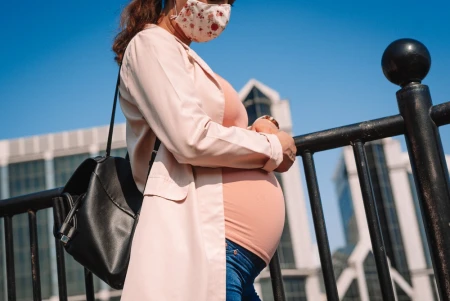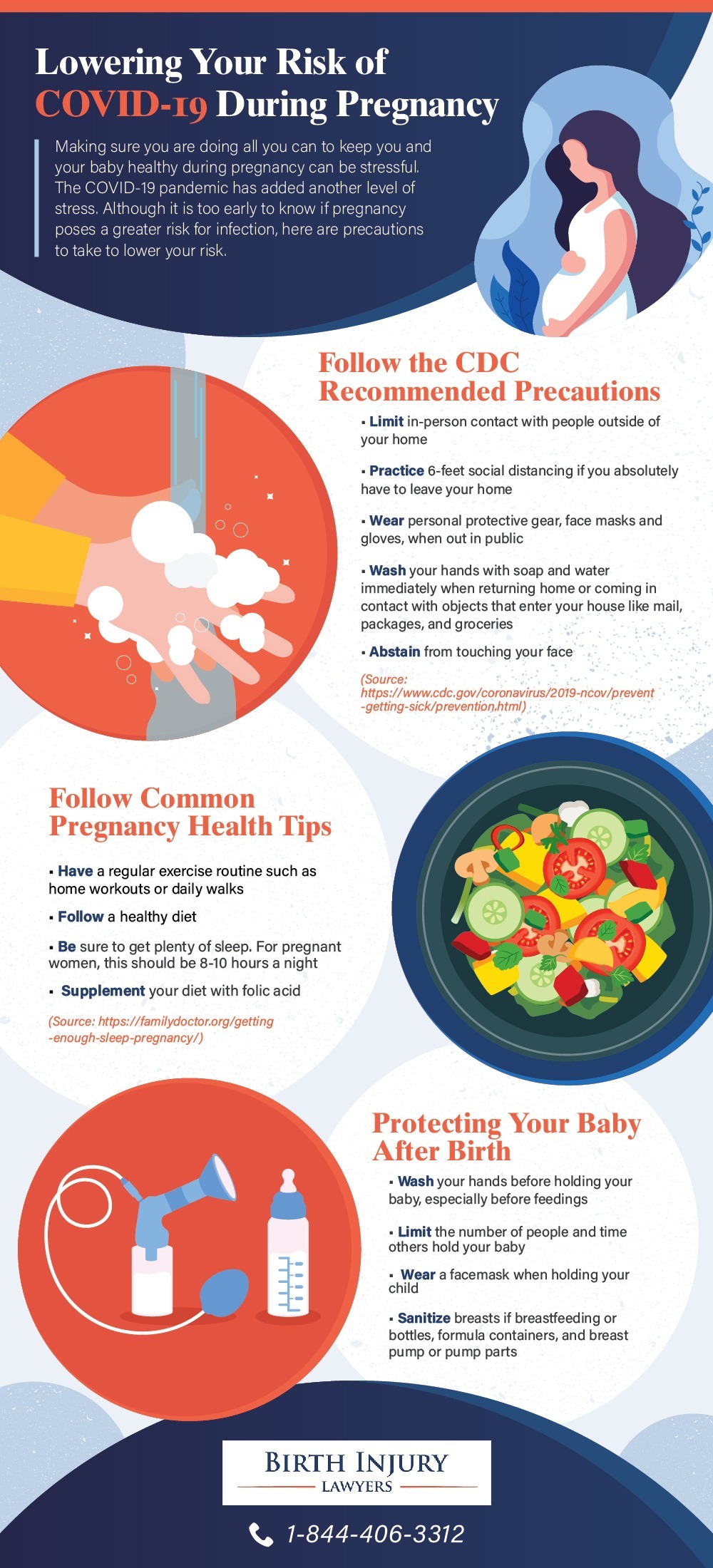
The Coronavirus Vaccine in Pregnant Women
Until recently, there hasn’t been much information about how the COVID-19 vaccine affects pregnant or nursing women. However, according to the newest research, the vaccine is not harmful to babies, and the side-effects of the vaccine are the same as they are in women who are not pregnant or nursing.
If you are vaccinated during your pregnancy, your baby will also carry the antibodies to the disease. Although vaccines are known to carry some form of small risk, you should expect nothing more than a fever lasting a day or two, which can be treated with acetaminophen.

A pregnant woman wearing a mask. Taking small steps like this can help keep your baby safe.
"If your child was born with a birth injury, or cerebral palsy, we can help."
What the Latest Research Says About the COVID Vaccine and Pregnancy
The largest study to date was published in the American Journal of Obstetrics and Gynecology. It examined 131 vaccine recipients, including:
- 84 who were pregnant
- 31 who were breastfeeding
- A control group of 16 women who weren’t pregnant
The results concluded that the vaccines are effective at protecting pregnant women and their babies from COVID-19.
Is the COVID-19 Vaccine Safe for Pregnant Women?
There is a lot of misinformation about COVID-19 vaccination, especially when it comes to pregnant women. As of February 8, 2021, there are two immunizations available in the U.S.: Pfizer-BioNTech and Moderna. Both are mRNA vaccines and require two injections.
According to current CDC guidelines, if you are pregnant, you should speak to your doctor to determine if it is in your best interests. Leading virus expert Dr. Anthony Fauci has stated that around 10,000 pregnant mothers received COVID-19 vaccinations in the first two months of approval in the U.S. There have been no reported major concerns related to these vaccinations.
Vaccine Safety in Pregnant Women
In agreement with the CDC, the American College of Obstetricians and Gynecologists (ACOG) has argued that pregnant women should consider receiving the Pfizer-BioNTech or Moderna vaccine when it comes time for them to do so according to the CDC guidelines.
These mRNA vaccines do not enter the nucleus, therefore they cannot cause any genetic changes to mothers or babies. More research is coming, but probably not in time for women who are already pregnant.
Pfizer will begin a clinical study of its vaccine in pregnant women early in 2021. Moderna plans to start a registry to log any side effects experienced by pregnant women.
Is the COVID-19 Vaccine Safe if You’re Trying to Get Pregnant?
Women who are trying to become pregnant should know that the mRNA in both the Pfizer-BioNTech and Moderna shots does not impact fertility. Pfizer is currently conducting a vaccination trial in 4,000 pregnant women, and it is expected to be completed late this year.
"We know first-hand what you are going through."
What Do Pregnant Women Need to Know About Coronavirus?
What pregnant women need to know about the coronavirus is their level of risk, the risk to their child, and best practices for keeping themselves safe.
Pregnancy is one of the most meaningful experiences in many women’s lives, but it can also be one of the most vulnerable. For pregnant women, this crisis can be incredibly frightening due to the rapid pace at which infections are spreading.
Countries across the world have implemented social distancing and lockdown procedures. People suspected of infection have quarantined, and hospitals continue to work around the clock as the influx of patients threatens to grow beyond the resources available.
"Our Birth Injury Lawyers have recovered over $750+ Million on behalf of our clients."
Elevated Levels of Risk for Pregnant Women
A January 2021 study found that pregnant women have an increased risk of death and serious complications if they become seriously ill with COVID-19. Among the critically ill pregnant women in the study:
- Half required a cesarean section (c-section) delivery
- Half of the babies required a stay in the neonatal intensive care unit (NICU)
- 42% of babies were born before 37 weeks gestation
- 40% of the mothers developed high blood pressure during the pregnancy
Pregnant women’s bodies undergo radical chemistry and hormone changes. Due to this fact, some pregnant women have been known to have especially adverse reactions to respiratory infections similar to the coronavirus.
Pregnant Women May Be at an Increased Risk of Serious Illness
Those who are pregnant have an increased risk of severe cases of COVID-19, which may require hospitalization, mechanical ventilation, intensive care unit (ICU) stays, and death compared to women of the same age who are not pregnant.
According to a Centers for Disease Control and Prevention (CDC) study, pregnant women over 35 were almost four times more likely to need mechanical ventilation than women with COVID-19 who are not pregnant. Adverse pregnancy outcomes are also possible, including premature birth.
When it Comes to COVID-19 and Pregnancy, Caution Is Advised
Because of the increased risk of complications, it is crucial for you to do what you can to avoid exposure to COVID-19 if you are pregnant. It is best to abide by the safety precautions recommended for lowering the COVID-19 infection curve.
These strategies include the following:
- Limiting in-person interactions when possible
- Social distancing
- Wearing protective gear like face masks and gloves in public
- Washing hands with soap and water
- Abstaining from touching your face
COVID-19 and the Risk to Your Baby
Understandably, many pregnant women worry about the risk of spreading coronavirus to their child in utero. While it is known that viruses can have devastating effects on pregnant women, more research is needed to learn whether COVID-19 has an impact on the baby.
The data currently suggests that coronavirus is not commonly spread to the baby in utero, during labor, or delivery. According to ACOG, there have been a few cases of COVID-19 that appear to have been contracted in-utero, but this has been very rare. However, a definitive answer to this question is still forthcoming, as more research is required.
Additionally, there have been a few pregnant women with COVID-19 who have had preterm births. Unfortunately, we do not know whether this was caused by the presence of coronavirus, though it seems unlikely.The ACOG recommends a cesarean section (c-section) only when medically justified and not as a matter of course for pregnant women with COVID-19.
Coronavirus Transmission After Your Baby Is Born
Though the medical community is not yet sure whether the virus can spread to a baby in the womb, a child who has been born becomes fully susceptible to the same risks as everyone else. A limited number of babies have tested positive for coronavirus, though hospitals are unsure whether this results from an in-utero transmission or postpartum infection.
Limiting your baby’s exposure is important. To keep your baby safe, you should:
- Wash your hands before holding your child.
- Limit the number of people, including family members, who have access to your child.
- Wear a facemask when holding your child, especially if you are infected.
You should follow these steps whether or not you are suffering from any of the symptoms of COVID-19. Even without symptoms, you could still be infected.
Good Practices to Stay Healthy
To keep yourself and your baby healthy during the COVID-19 pandemic, abide the social distancing guidelines in your state and follow the usual recommendations for prenatal care.
You can stay healthy and lower your risk by making sure you:
- Get regular exercise
- Eat a healthy diet
- Get plenty of sleep
- Supplement your diet with folic acid
- Consider getting the vaccine based on your doctor’s recommendation
There is new information coming out regularly that affects what pregnant women need to know about coronavirus. Keep checking back here and find more tips for a healthy pregnancy during the pandemic at familydoctor.org, a resource from the American Academy of Family Physicians (AAFP).
Keeping Your Baby Safe from COVID After Birth
Even though this may be a scary time for expectant mothers, a child’s birth is also exciting and joyous. There are numerous resources available to help you assuage your fears of COVID-19, including FAQs from the CDC.
Post-birth life can be challenging even in the best of times, and surely the presence of coronavirus and the accompanying hysteria does not help mothers relax and enjoy these first few months with their new baby. Below are some answers you may find helpful.
Breastfeeding in the Era of COVID-19
You will be glad to hear that the virus has not been detected in breast milk in the limited studies performed by medical experts. This suggests that, with proper precautionary measures, breastfeeding is possible and low-risk even for mothers infected with the coronavirus.
The CDC recommends the following precautions to ensure that your breastfeeding experience is as safe as possible for both you and your baby:
- Wearing a face mask
- Washing hands before each feeding time
- Washing hands before touching any pump or pump parts
- Letting an uninfected person feed the baby after breast milk expression, if possible
- Dedicating a pump to use while you are infected
- Cleaning the breast pump and pump parts after each feeding, per CDC recommendations
Skin-to-Skin Contact with Your Baby
Close contact with your baby will strengthen your bond. Even if you are diagnosed with coronavirus, the WHO still recommends skin-to-skin contact after birth. As long as you wash your hands before and after touching your baby and keep surfaces clean, you should be allowed to hold and breastfeed your child.
Stay Up to Date Keep You and Your Baby Healthy
The Birth Injury Lawyers Group wants to provide you with accurate, up-to-date information addressing what pregnant women need to know about coronavirus. This will allow you to combat the coronavirus rumors and protect yourself and your unborn baby.
What pregnant women need to know about the coronavirus is their level of risk, the risk to their child, and best practices for keeping themselves safe.
The COVID-19 pandemic, also known as the coronavirus, has spread quickly and generated a startling infection rate. For pregnant women, this crisis can be incredibly frightening. Pregnancy is one of the most meaningful and positive experiences in many women’s lives, but it can also be one of the most vulnerable.
Countries across the world have implemented social distancing and lockdown procedures. People suspected of infection have quarantined, and hospitals continue to work around the clock as the influx of patients threatens to grow beyond the resources available.
The Birth Injury Lawyers Group wants to provide you with accurate, up-to-date information addressing what pregnant women need to know about coronavirus. This will allow you to combat the coronavirus rumors and protect yourself and your unborn baby.
Elevated Levels of Risk for Pregnant Women
Unfortunately, early studies show that pregnant women may be at a higher risk of serious complications from a COVID-19 infection than those who are not pregnant.
A January 2021 study found that pregnant women have an increased risk of death if they become seriously ill with COVID-19. This is elevated risk is compared to women who are not pregnant and pregnant women who have only mild symptoms of the illness. These women are also at an increased risk of significant pregnancy complications.
Among the critically ill pregnant women:
- Half of them required a cesarean section (c-section) delivery
- Half of the babies required a stay in the neonatal intensive care unit (NICU)
- 42% of babies were born before 37 weeks gestation
- 40% of the mothers developed high blood pressure during the pregnancy
The same risks of other similar infections are also present with COVID-19. In its Q&A on COVID-19, pregnancy, childbirth, and breastfeeding, the World Health Organization (WHO) stresses that pregnant women’s bodies undergo radical chemistry and hormone changes. Due to this fact, some pregnant women have been known to have especially adverse reactions to respiratory infections similar to the coronavirus.
Pregnant Woman May Be at an Increased Risk of Serious Illness
Those who are pregnant have an increased risk of severe cases of COVID-19, which may require hospitalization, mechanical ventilation, intensive care unit (ICU) stays, and death compared to women of the same age who are not pregnant.
According to a Centers for Disease Control and Prevention (CDC) study, pregnant women over 35 were almost four times more likely to need mechanical ventilation than women with COVID-19 who are not pregnant. Adverse pregnancy outcomes are also possible, including premature birth.
Caution Is Advised
Because of the increased risk of complications, it is crucial for you to do what you can to avoid exposure to COVID-19 if you are pregnant. It is best to abide by the safety precautions recommended for lowering the COVID-19 infection curve.
These strategies include the following.
- Limiting in-person interactions when possible
- Social distancing
- Wearing protective gear like face masks and gloves in public
- Washing hands with soap and water
- Abstaining from touching your face
Risks to Your Child
Understandably, many pregnant women worry about the risk of spreading a disease like the coronavirus to their child in utero. While it is known that viruses in the same general family as coronavirus, such as influenza, can have devastating effects on pregnant women, more research is needed to learn whether COVID-19 has an impact on the baby.
The data currently suggests that coronavirus is not commonly spread to the baby in utero, during labor, or delivery. According to the American College of Obstetricians and Gynecologists (ACOG), there have been a few cases of COVID-19 that appear to have been contracted in-utero, but this has been very rare. However, a definitive answer to this question is still forthcoming, as more research is required.
Additionally, there have been a few pregnant women with COVID-19 who have endured preterm births. Unfortunately, we do not know whether the preterm births were caused by the presence of coronavirus, though this seems unlikely. ACOG recommends a cesarean section (c-section) only when medically justified and not as a matter of course for pregnant women with COVID-19.
Transmission After Your Baby Is Born
Though the medical community is not yet sure whether the virus can spread to a baby in the womb, a child who has been born becomes fully susceptible to the same risks as everyone else. A limited number of babies have tested positive for coronavirus, though hospitals are unsure whether this results from an in-utero transmission or postpartum infection.
Physical contact with a sick person can infect a baby just as easily as it can infect anyone else, so limiting your baby’s exposure is important. You may want to engage in the following procedures to help ensure that your baby is insulated from coronavirus, especially if you suffer from any of the symptoms of COVID-19.
- Wash your hands before holding your child.
- Limit the number of people, including family members, who have access to your child.
- Wear a facemask when holding your child, especially if you are infected.
Good Practices to Stay Healthy
Other than abiding by the social distancing guidelines in your state, the usual recommendations for prenatal health during pregnancy are still applicable. Of course, you should avoid the consumption of alcohol, tobacco products, and illegal drugs. If you need to take prescription or over-the-counter medication, make sure you consult your doctor or obstetrician-gynecologist beforehand.
Other ways of maintaining your personal health and lowering your risk of contracting any illness include the following:
- Regular exercise
- Healthy eating
- Consistent sleep cycles
- Supplementing your diet with folic acid
- Considering getting the vaccine based on your doctor’s recommendation
There is new information coming out regularly that affects what pregnant women need to know about coronavirus. Keep checking back here and find more tips for a healthy pregnancy during the pandemic at familydoctor.org, a resource from the American Academy of Family Physicians.
What Pregnant Women Need to Consider About Vaccination
There is a lot of misinformation about vaccination, especially when it comes to pregnant women receiving the COVID-19 shots. As of February 8, 2021, there are two immunizations available in the U.S.: Pfizer-BioNTech and Moderna. Both are mRNA vaccines and require two injections.
Current CDC guidance for pregnant women says that you should speak to your doctor and care team to determine if it is in your best interests. An article published in USA Today quotes leading virus expert Dr. Anthony Fauci as saying that around 10,000 pregnant mothers received COVID-19 vaccinations in the first two months of approval in the U.S. There have been no reported major concerns related to these vaccinations.
Vaccine Safety in Pregnant Women
In agreement with the CDC, the ACOG has argued that pregnant women should consider receiving the Pfizer-BioNTech or Moderna vaccine when it comes time for them to do so according to the CDC guidelines.
According to a USA Today report, ACOG recognizes that this could be confusing and frustrating for pregnant women because it contradicts the recommendations from the World Health Organization (WHO).
While there are no major studies so far on how these vaccines affect pregnancy, there is also no evidence there is any risk to mother or baby. The vaccines currently in use contain no live virus, so they cannot cause COVID-19. In addition, the mRNA vaccines do not enter the nucleus and therefore cannot cause any genetic changes to the mother or baby.
Research is coming, but probably not in time for women who are already pregnant. According to the USA Today report, Pfizer will begin a clinical study of its vaccine in pregnant women early in 2021. Moderna plans to start a registry to log any side effects experienced by pregnant women.
Your Child’s Safety After Birth
Even though this may be a scary time for expectant mothers, a child’s birth is also exciting and joyous. There are numerous resources available to help you assuage your fears of COVID-19, including FAQs from the CDC.
Post-birth life can be challenging even in the best of times, and surely the presence of coronavirus and the accompanying hysteria does not help mothers relax and enjoy these first few months with their new baby. Below are some answers you may find helpful.
Breastfeeding in the Era of COVID-19
You will be glad to hear that the virus has not been detected in breast milk in the limited studies performed by medical experts. This suggests that, with proper precautionary measures, breastfeeding is possible and low-risk even for mothers infected with the coronavirus.
The decision of whether to breastfeed and when to start ultimately resides with you and your personal doctor. However, the CDC recommends the following precautions to ensure that your breastfeeding experience is as safe as possible for both you and your baby.
- Wearing a face mask
- Washing hands before each feeding time
- Washing hands before touching any pump or pump parts
- Letting an uninfected person feed the baby after breast milk expression, if possible
- Dedicating a pump to use while you are infected
- Cleaning the breast pump and pump parts after each feeding, per CDC recommendations
Skin-to-Skin Contact with Your Baby
Even if you are diagnosed with the coronavirus, the WHO still recommends skin-to-skin contact after birth. As long as you wash your hands before and after touching your baby and keep surfaces clean, you should be allowed to hold and breastfeed your child. Modern medicine has found that close contact helps a baby thrive and strengthens the bond between mother and baby.
Follow Guidelines to Keep You and Your Baby Healthy
Given the necessary social distancing measures that have changed our daily lives, it is understandable for expectant mothers to worry about their safety and the safety of their babies. While it does appear that pregnant women may get sicker than others if they contract COVID-19, taking steps to prevent infection can greatly reduce the risk to both mother and baby.
"We are committed to helping families who have suffered medical negligence."





